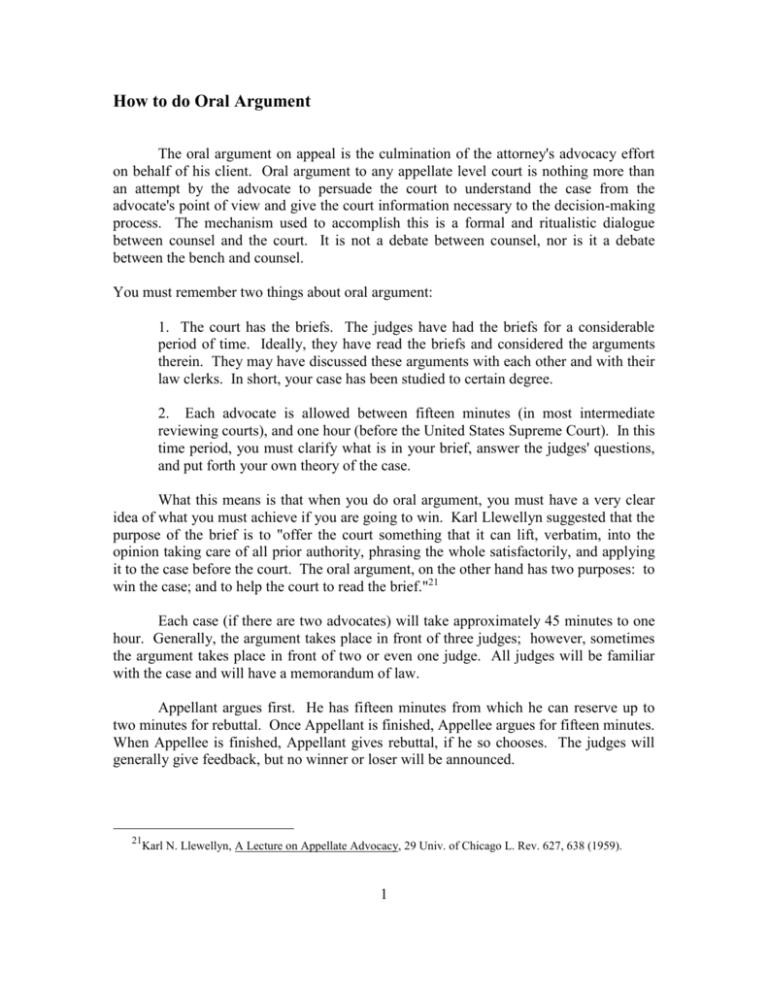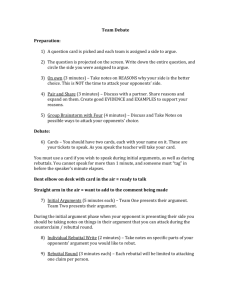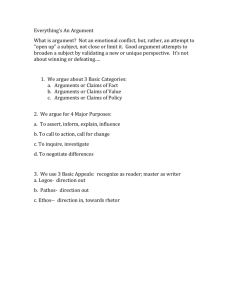How to do Oral Argument
advertisement

How to do Oral Argument The oral argument on appeal is the culmination of the attorney's advocacy effort on behalf of his client. Oral argument to any appellate level court is nothing more than an attempt by the advocate to persuade the court to understand the case from the advocate's point of view and give the court information necessary to the decision-making process. The mechanism used to accomplish this is a formal and ritualistic dialogue between counsel and the court. It is not a debate between counsel, nor is it a debate between the bench and counsel. You must remember two things about oral argument: 1. The court has the briefs. The judges have had the briefs for a considerable period of time. Ideally, they have read the briefs and considered the arguments therein. They may have discussed these arguments with each other and with their law clerks. In short, your case has been studied to certain degree. 2. Each advocate is allowed between fifteen minutes (in most intermediate reviewing courts), and one hour (before the United States Supreme Court). In this time period, you must clarify what is in your brief, answer the judges' questions, and put forth your own theory of the case. What this means is that when you do oral argument, you must have a very clear idea of what you must achieve if you are going to win. Karl Llewellyn suggested that the purpose of the brief is to "offer the court something that it can lift, verbatim, into the opinion taking care of all prior authority, phrasing the whole satisfactorily, and applying it to the case before the court. The oral argument, on the other hand has two purposes: to win the case; and to help the court to read the brief."21 Each case (if there are two advocates) will take approximately 45 minutes to one hour. Generally, the argument takes place in front of three judges; however, sometimes the argument takes place in front of two or even one judge. All judges will be familiar with the case and will have a memorandum of law. Appellant argues first. He has fifteen minutes from which he can reserve up to two minutes for rebuttal. Once Appellant is finished, Appellee argues for fifteen minutes. When Appellee is finished, Appellant gives rebuttal, if he so chooses. The judges will generally give feedback, but no winner or loser will be announced. 21 Karl N. Llewellyn, A Lecture on Appellate Advocacy, 29 Univ. of Chicago L. Rev. 627, 638 (1959). 1 Conduct and etiquette: Appellate advocacy is extremely formal, and the following rules apply: 1. Always begin your presentation to a court by saying, "May it please the court...." Next, always state your name and who you represent. These are immutable. 2. Always address the judge to whom you are speaking as "Your Honor," and refer to another judge as "Judge so-and-so." If the case is before the United States Supreme Court all members of the panel will be addressed as "Justice." 3. Always call your opponent by name, or "counsel for Appellant." Never say "my opponent," because we do not admit on an overt level the adversarial nature of this thing. We see it as a meeting of learned colleagues to iron out a knotty legal problem. In the same manner, stay away from the use of "I." The appropriate reference is "Appellant (Appellee) asserts, argues, feels, etc..." Use "I" only if it appears the panel is asking you a question that requires a personal opinion. 4. Please dress appropriately and professionally. 5. Your attitude toward the court should be one of respectful, intellectual equality. a. As much as you can, look at the court. Be sure to look at the judge addressing a question to you. b. Do not be intimidated by questions. Do not be argumentative, but make your points clearly and assertively. c. Be courteous; stand when the court addresses you. Do not lean on the lectern: grasp it in both hands, or put your hands behind your back. Try to remain as still as possible. d. Do not wave implements around, or gesture wildly at the court. Do not use histrionics. e. Never, ever, interrupt the court. Listen politely and carefully to every question and then answer it. 6. Do not read or memorize your argument. Be responsive as if you were really in conversation. 2 7. When your time is up, stop in mid-sentence. Either ask the panel, "May I finish answering the question?" or "May I conclude?" If you are given permission to conclude, either say "For all these reasons, we respectfully request the lower court be... (reversed) (affirmed)," or give a short summary of your position prior to your prayer for relief. No lengthy conclusions! 8. Sometimes the words "feel," or "clear," or "obvious" force moot court judges into a frenzy from which you may never recover. Be confident in your argument, but make sure you have adequate support for what you might declare an "obvious" conclusion. The Argument: The court will ask if you are ready. You stand, look the court in its collective eye and say "Yes, your Honor." You move to the bench. You arrange your notes, you look at the bench, establishing eye contact with the entire panel and say: "May it please the court, my name is ___________. I represent Appellant Tommy Smith. I would like to reserve one minute of rebuttal time." Pause, give the court a chance to take note of the time you reserved. Wait until the court tells you to proceed. The very first thing you must do is inform the court in simple and direct language about the issues. Remember to tell the court the general area of law and what kind of case this is. You then move into the facts, which you should tell chronologically and like a story. Facts should take no longer than about one minute. Try to be concise and understandable. If you are imprecise or confusing, you invite nasty questions from an irritated court. Do not ignore unfavorable facts. The court will bring them up and you will have to answer questions. Now you move into your argument. Briefly summarize your position and begin. What about the substance of oral argument? 1. What you need to do is take your brief and turn it from written to oral argument. You must ask yourself "What is the theory that I must get across to the court?" "What one or two points must I make?" This may mean not making certain arguments. It may mean reorganizing the order of the arguments. Remember that the court has the briefs. You do not simply read your brief on oral argument. Oral argument is the place where you clarify what is in your brief, where you argue facts and policy. Case law is used to buttress your points: know it thoroughly. 2. Do not plan to use your brief at the podium. This is both impractical and confusing. You may use any method of outlining you wish so long as you do not bring a 3 million papers to the lectern through which you must constantly shift. This wastes time, irritates the listener and makes you look as if you are unprepared. The best method is to take a file folder and outline on each side of the folder. If you have a lot of cases, a good idea is to put each one on a file card, and attach the cards where appropriate to the folder, so that you can flip through them, if you are asked about them. 3. You may get a quiet bench or an active bench. You will have no way of knowing. So, make sure you have an argument that runs approximately 8-10 minutes. Do not say to yourself, "I know I'll get questions, so I am going to have something real short." You may not get any questions. 4. As far as preparation goes, know the record and the law and know it well. Know case names and, with Supreme Court law, names of Justices, and the substance of their dissents (if any). Know jurisdictions and dates. When you prepare, consider the following questions and points with regard to both sides: a. Analyze and criticize the logic of the argument. Are there loopholes? What are the strengths and weaknesses? b. Think of policy to support and refute an argument: Do I have equity on my side? c. Understand the case law: be able to call up the facts of a case, its precise holding, and how it can be analyzed or distinguished on command. And please know how to pronounce the names of cases. d. Ask yourself, "If I were a court, how would I criticize or would I follow a particular case or argument?" As far as practicing goes, get yourself at least one other personCargue in front of her and let her judge you and criticize you. Then do the same for her. And do it several times. You might even switch arguments. Questions from the Bench: First of all, when you are asked a question: 1. Always answer the question asked. Never answer a different question. 2. Always answer honestly. If you do not know the answer tell the court you do not know the answer. 4 3. Never interrupt no matter how slowly or how stupidly the court asks a question. 4. If you do not understand a question, say so and ask the court to rephrase. 5. Do not pause once you have answered a question. Move right back into your argument. A pause will give the court a chance to ask another question. 6. Do not permit yourself to be antagonized, although intense questioning can be aggravating. 7. Try to recognize friendly or rescue questions. Sometimes the judge will ask a question to rescue you from the clutches of one of his persistent colleagues. Take the life line and pull yourself back into the argument. Sometimes a question is designed to give you a chance to give a favorable responseCto feel good. Respond firmly, "That's exactly the point, Your Honor." 8. Finally, do not be afraid to concede a point when tenacity will only get you into trouble, and concession will not hurt your case. What kinds of questions can you expect? Fact questions. There are several kinds of fact questions that may be asked of you: 1. Questions seeking information about the facts in your case. These can be avoided if you state the facts clearly and accurately, and if your argument is concrete. Do not be abstract; relate your discussion to the facts of your case. 2. The court may ask you to speculate on facts not in the record. Use your discretion. If you have no answer, do not accept the invitation. Tell the court that the fact is not in the record, and you do not want to speculate. However, if you feel confident, or feel that the judge really would like to know, then go ahead and speculate. Sometimes a refusal indicates to the panel Counselor's overall deficiency in understanding the case. Law Questions: The court will ask you about various authorities. There are several kinds of questions you might anticipate. For instance, the court may ask you about a specific case. It could be a case you or your opponent has cited, or it could be one which neither of you cited. It may be a case relevant to the issue you are discussing, or it may not. The court may simply say, "Counselor what about SvP?" or; "Counselor are you aware of SvP?" or, "Counselor will you please discuss SvP?" 5 What you need to do is describe the case and say for what propositions it stands and, if you can, use it as a bridge back into your argument. Two caveats: a. If you know nothing about the case, say, "I'm sorry Your Honor, I am not familiar with that case," and go right back to your argument. b. If it is a case you intend to address laterCdescribe it nonetheless and make briefly any point you intended to make about it and move back into your argument. Do not say, "I'll get to that when I discuss Issue Two." In some situations the court may deliberately misstate the law to see if you can handle something like that. Such a question calls for measured assertiveness. "With all due respect Your Honor, in SvP the court held.... This proposition has been accepted by several other courts" or something such as that. Hybrid fact and law questions: The court may pose a hypothetical fact situation to you and ask you how, given your position, you would resolve it. You need to be able to resolve it consistent with, and in favor of, your client's position. These kinds of questions can be motivated by various concerns. For example: a. The court merely wishes to explore the parameters of your argument and wants your aid. b. The court agrees that your position is fine if limited to the case before it, but is afraid of ramifications. c. The court does not fully understand your position, and, by use of hypotheticals, is seeking clarification. The court may ask you policy questions. It may want to know the factors you consider important, the consequences of the decision on particular categories of people, on the law, politically, etc.... Questions that test the logic of your argument: These could be hypotheticals, or policy questions, or case law questions; however, the court may also pick up on a point, and ask you about it. That point may be from your brief, your opponent's brief, or it may be a point you have just made. Finally, a couple of scenariosC(1) Occasionally, just as you begin to discuss an issue, a judge will say to youCwe are familiar with that issue and would like you to 6 address your second issue. Or you might be giving your statement of facts and the court may say, we are familiar with the facts, please move on. Do not say to the court, "I'll get to that." Do it. This means that you must be able to shift your argument. Your argument should be separable into various components that you can move around. Why does the court do this nasty thing to you? 1. Moot court judges are trying to test your flexibility and preparedness. 2. In the real world, when a court does this it is telling you very clearly where it believes the crux of your argument lays and what it considers important. The court is telling you, "We have no problem deciding issue one, it is issue two that is giving us trouble. So, let's spend all our time trying to understand issue two." Scenario 2: The court will often pose a question, and then pose further questions that will probe the efficacy of your answer. In other words, you may be involved in a lengthy dialogue on a narrow issue with one answer leading to another question and so on. If the discussion begins to deteriorate, if you are stuck on a point and the court will not let you go C you're going to have trouble getting through any other points. On the one hand, this intense questioning by one judge indicates that the judge is genuinely concerned about the issue he is probing, but in moot court this scenario is designed to test your ability to control the situation and escape back into your argument. You must, therefore, find a way to steer questions back to your argument, if you can. Do not wait for the court simply to stop its badgering. Sometimes another judge will try to rescue youClisten carefully. If, during a lengthy interrogation by one judge, another judge interposes, listen carefully to the tone of the question and ask yourself, is this a lifeline? If it is, take it and get back to your argument. After you have made your arguments, or you realize you have only a minute left, give a conclusion, two or three sentences (1) summarizing arguments and tying arguments together, and (2) requesting certain relief. Be sure to remember to tell the court what you want it to do. Say, "Thank you Your Honor," and sit down. Three points: 1. If, by some miracle, you finish early, just sit down. Do not try to kill the time remaining. 7 2. If, as is more usually the case, you have not gotten through your argument, your time is almost up, and you are in the middle of answering a question, finish your answer and conclude as quickly as you canC30 seconds, no more, and remember your prayer for relief. 3. Remember, if your time is up, stop, then ask for permission to conclude. (The court will probably say to you, "You may conclude, counselor.") Appellee's presentation should take into consideration everything Appellant would do with one difference with regard to the statement of facts: Appellee has to decide whether to restate the facts. Appellee has three options: 1. If you feel that the facts have been adequately and accurately set forth by Appellant, you may rely on them. Simply say, after stating your issue, something like, "Counsel for Appellant has stated the facts so we will not restate them." 2. If you feel that the facts, while generally well-stated have particular problems, bring the problems to the court's attention C "While Appellee agrees with Appellant's statement of facts generally, we would like to point out that...." 3. If, and this is unusual, you think the facts were so poorly stated or so slanted that you simply cannot agree with them, restate them. Do a really good job and the court may be very impressed. Rebuttal: Appellant will always set aside a minute or so of rebuttal time, but Appellant does not have to use it. If you have nothing to sayCdo not use it. If you decide not to use it, stand up and tell the court you will submit the case on your previous argument unless the court has questions. (Remember, every time you stand up to address the court, you must say, "May it please the court....") If you decide to use it, use it only to rebut points made by Appellee during his argument. Respond only to especially damaging arguments made by opposing counsel. Do not respond merely for the sake of responding. Make it short, and to the point. Introduce new material only if necessary to answer questions raised by the court during Appellee's argument, or by Appellee. Once you have made your point, give your prayer for relief, and sit down. Do not give the court a chance to question you. If you must use rebuttal, you want it to be effective. Getting stuck in a series of questions is not effective. As always, if you run out of time, ask to conclude, and then give your prayer for relief. 8







